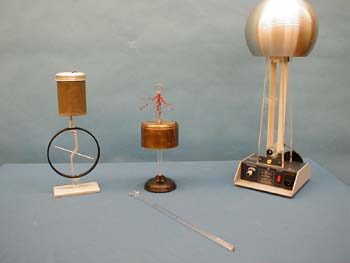Demos: 5A-26 Area Dependence on Capacitance

A conductor consists of a telescoping set of metal cups. Thin paper strips are attached to the end of a small post affixed to the uppermost cup. The conductor is then charged, causing the paper strips to stand out. Using an insulated hook, the conductor is extended upward. The paper strips slowly collapse because of the decreasing potential of the conductor resulting from the increase in its surface area. If the conductor is collapsed back to its original orientation, the leaves will again diverge.
This effect can also be demonstrated using a metal can inside of which is approximately 60 cm of chain. The chain may be lifted out by means of a glass hook. The can is placed on an electroscope and charged. The change in deflection of the electroscope is observed as the chain is lifted.
If there is no leakage of charge, Q is constant so if A increases, ®V decreases. And since
this means that the capacitance increases.
Directions: 1. Make sure there is no residual charge on the paper strips and ground the cups to remove any excess charge. Charge the cups using the ebonite rod and fur (or perhaps an electrostatic generator). Several strokes and wipes may be necessary to transfer an adequate charge. Do not allow too much time to pass before lifting the cups, else there may be a natural collapsing due to charge leakage. In lifting the cups to extend the area, try to avoid getting any part of your body near the strips of paper, which could cause a premature leakge of the charge.
2. As in the first example, do not let too much time pass in observing the results to avoid the confounding effects of charge leakage.
Suggestions for Presentation: Discuss what effect the area of a conductor should have on the capacitance. What remains constant if there is no charge leakage. Then move to the expressions above to help students predict what will happen.
Applications:
Last Updated: Nov 30, 2023 11:25 AM